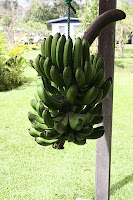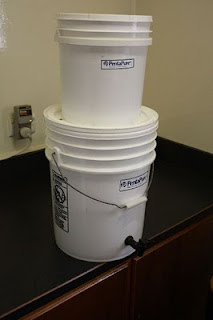 |
| Front of our home |
 |
| Back - notice 3rd water tank |
 |
| Canna Lily in yard |
 |
| Now on our patio |
 |
| In our tree |
 |
| 2 water tanks plus solar hot water on top |
 |
| Water filter wrapped around drop pipe |
 |
| Filtered water from spigot |
Every home has a solar hot water system mounted on the roofs. As long as there is a reasonable amount of sun each day, the water is very hot. If there isn’t enough sun, especially in the rainy season we’ll be heading into more, there is a switch we can turn on that electrically heats the water. We only turn it on for 30 minutes in that case because anything more costs in the expensive electricity.
There is no heat in the house except for a small standalone wood stove (flimsy by Vermont standards). The windows are louvered with glass panes that really don’t seal against cold drafts at night. Every house has mostly worn curtains and then heavy draperies that, when closed, do a reasonable job keeping the cold out.
At the same time, we did bring the recommended “space blanket” (thin, silver colored 6x8 sheet) to cover ourselves since this reflects our body heat back upon us. We are also wearing flannel pajamas in August. When we walk around on the wood (and some slate) floors, we are wearing the also-recommended slipper socks which have anti-slip bottoms but nice, thick, warm material.
Being just two of us, we’re not using most of the house. It also means there’s plenty of water (cold and hot), hedging our bets against ever needing to open some values to switch more of the house plumbing over to river water.
It also means we get to have more live-in company. There are cockroaches most anywhere in the world you might travel and PNG is no exception. I saw them when I was in Nairobi, Kenya, along with other crawly things. Here it only appears to be cockroaches. They vary from medium size to large and can be found most anywhere. The owners left some traps around the house so it really hasn’t been so bad except when Julie sees them. Then I have to conduct WW III until that bug is history.
We do have friendly guests, too. Geckos are our friends though I’m sure they didn’t feel welcome at the start. They make loud squeaks and kissing sounds and the first two nights here, Julie had me running around opening closets and hunting for mice or rats. We were eating at someone’s house when Julie mentioned this and they laughed. Gecko housemates are welcome because they eat cockroaches. I did kill one last night and leave it out for one of our geckos but, unlike Santa Clause, it didn’t indulge in the midnight snack. I tossed the cockroach the next morning.
Because of the number of break-ins by the local “raskols”, we hide everything of any value (even small things) in clever places we wouldn’t think to look (and then we forget where we put them). We do this every morning on the way out to work, after lunch, if we go out visiting in the evening, and before bed. I have to say I have a very ingenious place where we stash our laptops, the number 1 prize for every raskol.
The home has quite a few security features installed by the owner, simply because this home has the reputation of being the #2 most broken-into home. The front door has four deadbolt locks spaced around the frame of which one requires a key. The back door has two deadbolt locks (both must have keys) and two heavy metal bolts top and bottom. The house has a security alarm with two panic buttons and motion detectors in the living room and in the central hall. All windows that can be opened have sturdily installed bars and are electrified.
I hope to never need any of this.
Everyone essentially hires someone to periodically cut the grass, someone (called a yard meri) to maintain the gardens (flower and vegetable) once a week, and a inside maid (called a haus meri). The cost is very little, not counting the expectation that we provide food for the two short breaks and lunch. We’re surprised, however, at how much the nationals will eat in a very short period. Rumor has it that they don’t eat very often or very much the rest of the time so “live it up” when at their jobs.
We are continuing to use the people hired by the owners since they know the place and have proven reliable. The only problem we had the first week (last week) was how the haus meri took over and rearranged everything in the kitchen (which she doesn’t cook in) to her liking. We’ll nickname her “Sarge” though her name is really Iri (pronounced E-riee).
Everything in PNG is essentially wired for 240 volts with Australian=style plugs. The owner does have a transformer installed to provide US style 110 volts but most of our gear can use (with adapters) and certainly all of the appliances here use the higher voltage. If you plug in anything that can only use the lower voltage into the higher voltage outlet… well, it’s gone.
Hope to write about food the next time. Now, Julie, what is this you just handed me for dessert? …


Comments